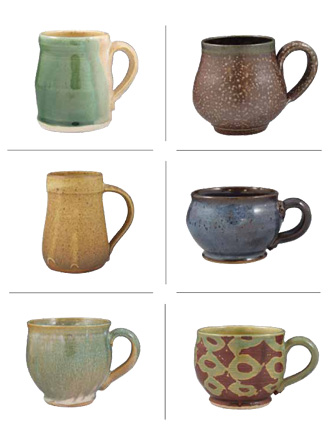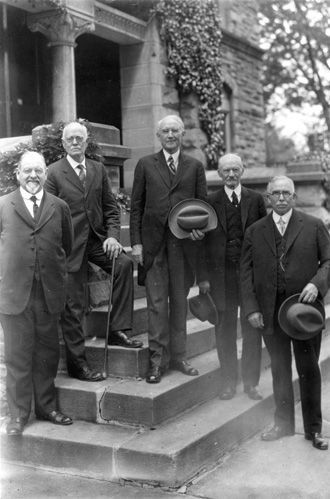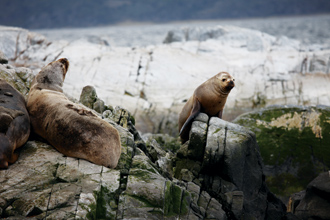Oberlin Alumni Magazine
Winter 2011-2012 Vol. 107 No. 1
Thought Process
Their Cups Runneth Over
 (Photos by Michael Roest ’06)
(Photos by Michael Roest ’06)
The ceramic mugs you see here were among the more than 500 created by community and student members of the Oberlin Pottery Co-Op and sold in December at the third annual Empty Mugs Holiday Brass and Organ Spectacular. Michael Roest ’06, ensemble librarian and manager for the conservatory, leads the event, which benefits Oberlin Community Services. Last year, the night of music and mugs raised $2,600; this year, it raised $5,600—far above its $4,000 goal. For more information, visit oberlin.edu/oam.
The House Was Quiet on a
Winter Afternoon
Someone was reading in the back,
two travelers had gone somewhere,
maybe to Chicago,
a boy was out walking,
muffled up,
alert on the frozen creek,
a sauce was simmering on the stove.
Birds outside at the feeder
threw themselves softly
from branch to branch.
Suddenly I did not want my life
to be any different.
I was where I needed to be.
The birds swirled in the dusk.
The boy came back from the creek.
The dead were holding us up
the way the ice held him,
helping us breathe the way
air helps snowflakes swirl and fall.
And the sadness felt just right,
like a still and moving wave
on which the sun shone brilliantly.
This poem, by Emeritus Longman Professor of English David Young, is reprinted from Field of Light and Shadow: Selected New Poems, which won the 2011 Ohioana Book Award for Poetry. Young, co-editor of Oberlin College Press, was honored this February for his lifelong commitment to poetry with a panel at the annual conference of the Association of Writers and Writing Programs, on the occasion of his 75th birthday. His other honors include fellowships from the Guggenheim Foundation, the National Endowment for the Arts, the National Endowment for the Humanities, and the Ohio Arts Council. To find our more about David Young, visit www.davidyoungpoet.com.
Tap’n Squares
 (Photo courtesy of the Oberlin College Archives)
(Photo courtesy of the Oberlin College Archives)
Most of the gentlemen in this 1927 photograph appear awfully sober—and for good reason. They’re the founders of the Anti-Saloon League, the pro-prohibition organization founded in Oberlin in 1893. Oberlin’s first professional librarian, Azariah Root ’84 (as in 1884), is at the far left, and Howard Hyde Russell, an 1888 Oberlin Theological Seminary graduate, is at the center. The league "would turn out to be the most effective political pressure group in American history," according to the Ken Burns and Lynn Novick documentary Prohibition, written by historian Geoffrey C. Ward ’62. The three-part series premiered in October 2011 on PBS.
Much of the group’s political muscle came from 1894 graduate Wayne Wheeler, a shrewd political operative who "made great men his puppets," according to the Cincinnati Enquirer. "Without Wayne B. Wheeler’s generalship," wrote The New York Herald Tribune upon his death in 1927, "it is more than likely we should never have had the Eighteenth Amendment." But until the PBS series, and Daniel Okrent’s Last Call: The Rise and Fall of Prohibition, Wheeler was mostly forgotten. Okrent calls Wheeler "the man who turned off the taps."
Inspired by this attention to Oberlin’s role in the national prohibition movement, New Hampshire writer Ken Braiterman ‘69 has written an article focused on local efforts to keep Oberlin dry. To read it, visit his website: kenbraiterman.com.
Visit oberlin.edu/oam for links to more information.

 Beagle Channel, November 2009
Beagle Channel, November 2009(Photo courtesy of Geoff Pingree's Antarctica series.)
Antarctica, November 2009 , is from the Antarctica Series, a group of photographs by Geoff Pingree taken during a tour of Antarctica he took with his fellow associate professor of cinema studies and frequent collaborator Rian Brown-Orso. The two created the multi-media installation "Blue Desert—Towards Antarctica," with a score by Peter Swendsen, assistant professor of computer music and digital arts. Pingree won the trip for two to Antarctica aboard the National Geographic Explorer as the grand prize of National Geographic’s World in Focus competition, for an image he took at the Prado Museum in Madrid.
For more, read an article about Pingree's multimedia installation.
Endquotes
"It’s easy to dismiss Oberlin College students for being idealistic lefties who fight the system while the rest of the free world watches football. But this time around, they look less like kooks and more like canaries in the hydraulic-fracturing mine."
Scene magazine writer Anastasia Pantsios, referring to Oberlin students being the first opponents of fracking to be arrested in the U.S. (at a November 30 protest), after two earthquakes rocked Youngstown, Ohio, in December
"Can’t decide if a heart-to-heart with Marlo Thomas would clear up all my more major life confusions or create oodles of new ones."
Lena Dunham ’08 (@lenadunham), January 19 via Twitter. Lena Dunham’s television show Girls premieres April 15, 2012
"[Professor of Piano Peter] Takács’ playing is clean, his expression subtle, his rhythms supple, his power unrivaled; furthermore, his understanding of Beethoven’s methods and expressions is so profound that this set warrants the highest honors."
Blair Sanderson, All Music Guide, on Takács’ recordings of the complete Beethoven piano sonatas
"Fail forward, fail fast, and fail fruitfully."
Advice given by Martha Nace Johnson ’74, administrator of the federal General Services Administration, to her staff and others to encourage innovation
"Also, would you prefer paella or democracy?"
New Yorker television critic Emily Nussbaum ’88, explaining her problem with ranking television shows into Top 10 lists
Sources: Takács, allmusic.com; Dunham, Twitter; Johnson: interview with OAM; Nussbaum: New Yorker’s Culture Desk blog
